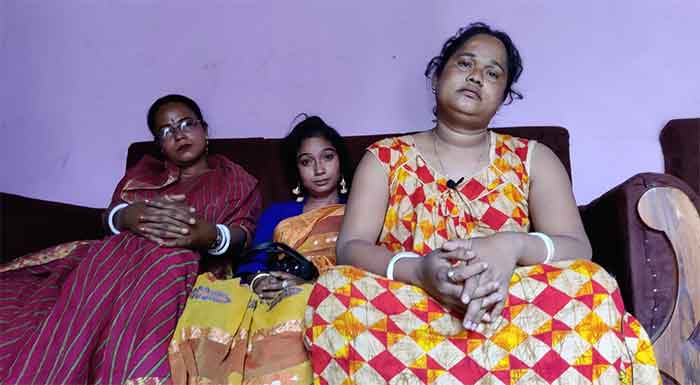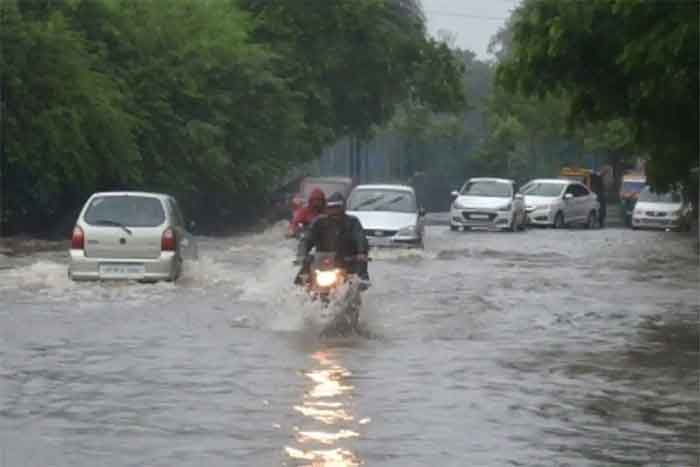
Kolkata: The 26 transgender people of a Cooch Behar village, West Bengal had their last wholesome meal before the first lockdown. For the past 15 years, they have been staying in a rented one-room-kitchen house, perched in the middle of potato and paddy fields of Bairagi Hatt hamlet in Mathabhanga block. But for the first time ever, they have been unable to pay the rent.
“The landlord has been kind enough to let us stay,” said Pinky Barman (45), fondly called deeda by other members of the house.

These people here belong to the ancient tribe of Koch Rajbonshi. It has roots in the epoch of the Koch kingdom that once ruled and developed the Cooch Behar town. For generations they have performed the Jatra — a Bengali and Assamese folk theatre and sung Bishohara and Satyapir (devotional songs) in various parts of the district.
Now, they have been reduced to scurrying for food. “With the sudden lockdown after lockdown, our life has come to a standstill. There have been days when we have had just water. Last year, we were at least able to beg our neighbours for help, following which we got rice, pulses and potatoes. But this time, everybody is helpless. Sometimes when the neighbours throw vegetable waste, we rummage through it,” said Barman.
Hunger has added to the other constant struggles the community faces, during the pandemic or otherwise, which has been compounded by lack of follow through on government initiatives.
“In 2014, the government recognised the third gender. But, what has happened since then? During the lockdown, the government woke up and realised that we deserve to eat and only then they issued ration cards to some of us. Most are yet to get it,” said Tapan Dey (24), who lives with Barman. “Only if I had altered myself to what my parents wanted me to be, maybe I could have had easy access to government documents such as voter identification, Aadhaar Card, Pan Card, bank accounts, ration card, Swasthya Sathi card and so on,” Dey added.
Eight trans beds in all of WB
In July 2015, the state department of women and child development and social welfare constituted the West Bengal Transgender Development Board to address the issues and extend the benefits of all developmental schemes. “To date, there has been no census of the community,” said Ranjita Sinha, advisor of Association of Transgender/Hijra in West Bengal and a former Transgender Development Board member.
The absence of trans-friendly homes for minors and hospital beds have caused untold angst among the community. “A teenager, who identifies as a transgender person, cannot be put in a children’s home as the chances of them facing mental and physical harassment are higher. The child protection department is yet to understand the basics — not all children can be categorised as boys or girls. I have been writing letters to the state and Central governments regarding the issue. But, nothing has happened yet,” said Sinha.
Last year soon after the COVID-19 outbreak, Sinha had urged the minister of state for health and family welfare, Chandrima Bhattacharya, to allot beds for transgender people in hospitals. The minister immediately allocated four beds for transmen in the male ward and four beds for transwomen in the female ward of the severe acute respiratory illness department of MR Bangur Hospital, Kolkata.
However, she said this is not enough and believes that the services should reach every part of Bengal, especially during the pandemic. The slow trickling help has not addressed the community’s existing problems — abandonment and transphobia. Such incidents have only risen amid the pandemic, compelling the community members to look out for one another even as they struggle to meet necessities.
Once abandoned, now hungry
Madhusudan Sarkar (63), who lives near the tea garden of Dalgaon Basti in Birpara with 15 others, is raising two abandoned children and one orphan. They are all less than 10 years of age.
“Last year, during the lockdown, I got a call from a hospital in Siliguri, saying that a ‘hijra baby’ was born and the parents do not want to keep it. I brought the baby home. Our neighbours visited to see what a ‘hijra baby’ looks like; they offered clothes, milk, baby food and some money for the baby’s medical check-ups,” Sarkar said.
Eight years ago, she brought another ‘hijra baby’ home from Falakata hospital in Falakata town, or so she thought. The infant cried for two days, much to Sarkar’s concern. The lower abdomen was abnormally swollen and the doctor diagnosed the baby with hernia. Surgery was possible only after 18 months but the diagnosis meant that the baby wasn’t a ‘hijra baby’ but a girl. “When I informed the Falakata hospital staff, the parents came to see her. They visited her often for three years but never took her back. I adopted her legally. I think I was destined to be her mother,” said Sarkar.
She has been unable to feed her kids adequately during the second lockdown. “It is the worst kind of feeling,” she said.
An LPG cylinder is too expensive. Thus, they have to collect twigs and wood from the forest for the mud stove. The activity is a dangerous one due to the looming threat of elephant attacks, according to Sarkar.
With no means to cook, they are barely managing on puffed rice or salt and rice. On some days, she has crushed puffed rice and mixed it in water to feed the children. “They hate it, but I got nothing else to feed,” Sarkar said, adding, “All of us have become skinny. Our children are underweight.”
Hunger did not reign so harshly last year. Food came from the neighbours, or money was deposited at a small temple at the entrance of Sarkar’s house, which was then used to buy food. The donations were a pittance compared to their major source of earnings — weddings, religious events, and the birth of a child. It has faded away since.
The West Bengal assembly elections opened a small money-making window for many like Mona Barman (30), who has been performing for many years and earning at least a thousand at traditional events. However, there was a diminished demand for her entertainment along with resentment against her community. “We were asked to leave from the gate. Some threw two or five rupees from the gap of their entrances and asked us to leave. We collected the coins and returned home,” Barman said.
Sheltering the bruised
Sinha said that many community members have been struggling and a few organisations have rushed to the rescue. though many others have not been able to reach those affected due to the lockdown.
Gokhale Road Bandhan — a community-based organisation for transgender people’s well-being — rented a flat to 10 transgender men and women who became homeless during the pandemic. “On March 12, 2021, the National Institute of Social Defence included our safe home project under its Garima Greh (shelter for transgender persons) scheme and implemented it from April this year,” said Sinha, who is also the project director of Garima Greh.
The sheltered members have been the victims of domestic violence inflicted by their parents. Some were beaten black and blue and thrown on the streets in this pandemic.
“Every day, I have received around 100 calls seeking help from Phool Bagan, Tangra, Dhapa, Kadapara and Beleghata. We have been arranging shelters,” said Rajkumar Das, secretary of a transgender group, Anandam, from Kadapara, Phool Bagans.
Purnima Sah is a Cooch Behar-based freelance journalist and a member of 101Reporters.com, a pan-India network of grassroots reporters.














































